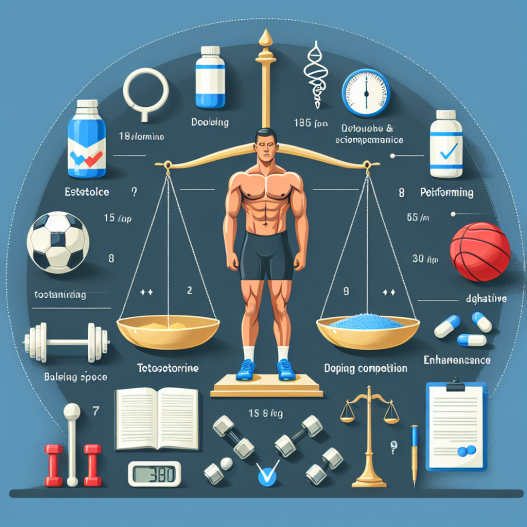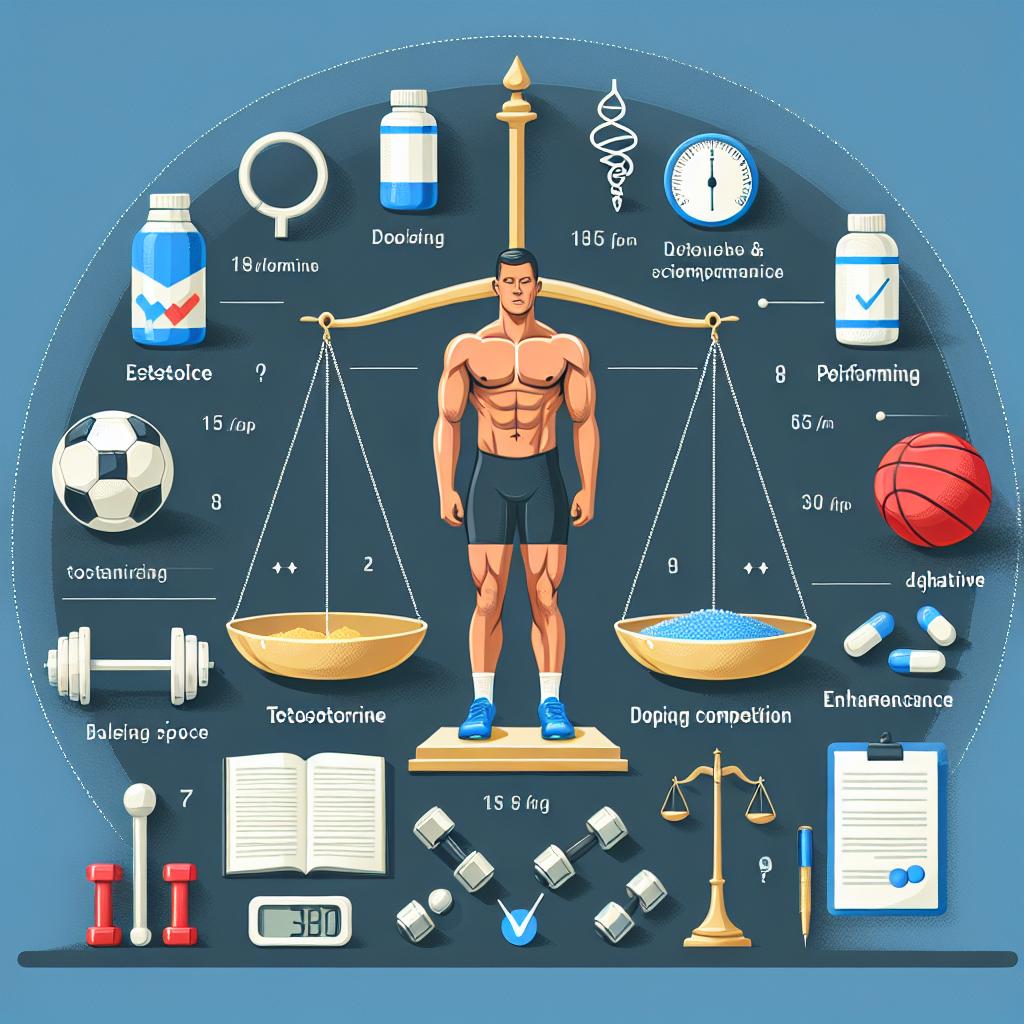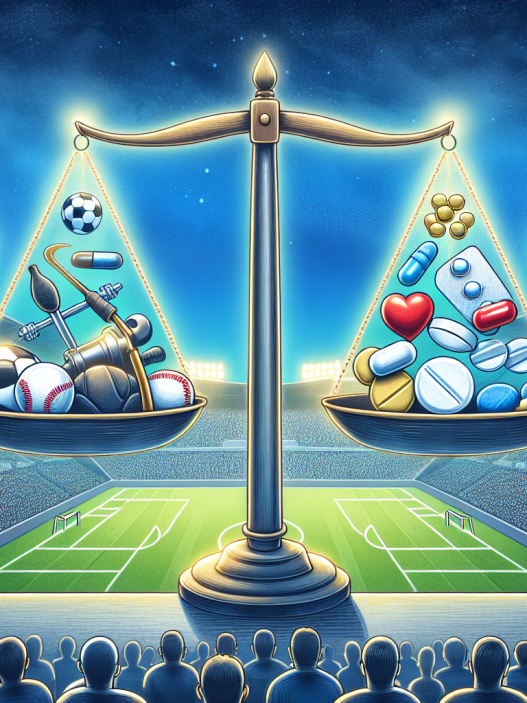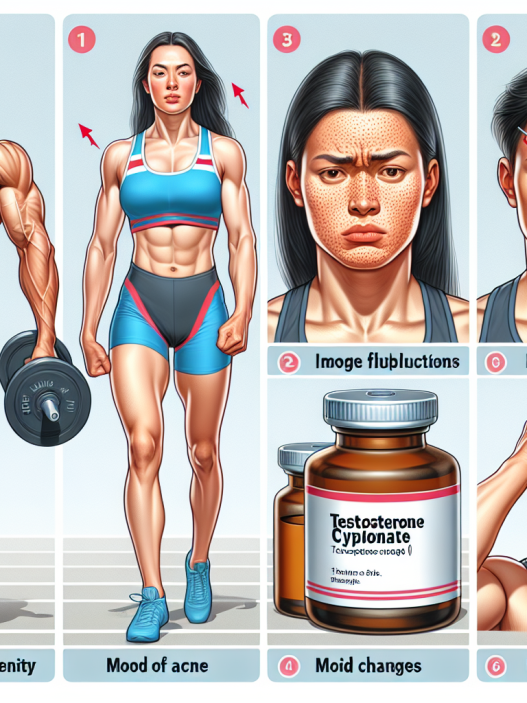-
Table of Contents
- Ethical and Legal Implications of Testosterone and Doping in Sports
- The Use of Testosterone in Sports
- The Ethical Implications of Testosterone Use in Sports
- The Legal Implications of Testosterone Use in Sports
- The Pharmacokinetics and Pharmacodynamics of Testosterone
- Real-World Examples of Testosterone Use in Sports
- Expert Opinion on Testosterone Use in Sports
- Conclusion
- References
Ethical and Legal Implications of Testosterone and Doping in Sports
Testosterone is a naturally occurring hormone in the human body that plays a crucial role in the development and maintenance of male characteristics. It is also known to have anabolic effects, meaning it can increase muscle mass and strength. As a result, testosterone has been used by athletes for performance enhancement, leading to ethical and legal implications in the world of sports.
The Use of Testosterone in Sports
The use of testosterone in sports is not a new phenomenon. In fact, it has been used since the ancient Olympic Games, where athletes would consume animal testicles in hopes of gaining an advantage. Today, testosterone is used in various forms, including injections, gels, and patches, to enhance athletic performance.
One of the main reasons athletes use testosterone is to increase muscle mass and strength. This is especially prevalent in sports that require high levels of physical strength, such as weightlifting and bodybuilding. Testosterone can also improve endurance and recovery, allowing athletes to train harder and longer.
However, the use of testosterone in sports is considered doping, which is defined as the use of performance-enhancing substances or methods that are prohibited by sports organizations. Doping not only goes against the spirit of fair play in sports but also poses serious health risks to athletes.
The Ethical Implications of Testosterone Use in Sports
The use of testosterone in sports raises several ethical concerns. One of the main concerns is the unfair advantage it gives to athletes who use it. Doping goes against the principle of fair competition, where all athletes should have an equal chance to succeed based on their natural abilities and hard work.
Moreover, the use of testosterone can also lead to the exploitation of athletes. In some cases, athletes may feel pressured to use testosterone to keep up with their competitors or to please their coaches and sponsors. This can create an unhealthy and dangerous environment for athletes, where their well-being is compromised for the sake of winning.
Another ethical concern is the message it sends to young athletes and the general public. The use of testosterone in sports promotes the idea that success can only be achieved through artificial means, rather than through hard work and dedication. This can have a negative impact on the values and integrity of sports, as well as on the overall perception of athletes.
The Legal Implications of Testosterone Use in Sports
In addition to ethical concerns, the use of testosterone in sports also has legal implications. Doping is considered a violation of the rules and regulations set by sports organizations, such as the World Anti-Doping Agency (WADA) and the International Olympic Committee (IOC). Athletes who are caught using testosterone or other banned substances can face serious consequences, including disqualification, suspension, and loss of medals and titles.
Moreover, the use of testosterone in sports can also have legal consequences outside of the sports world. In some countries, the use of performance-enhancing drugs is considered a criminal offense, and athletes can face legal charges and penalties. This not only affects the individual athlete but also their team, coaches, and sponsors.
The Pharmacokinetics and Pharmacodynamics of Testosterone
In order to fully understand the implications of testosterone use in sports, it is important to examine its pharmacokinetics and pharmacodynamics. Testosterone is a lipid-soluble hormone that is primarily produced in the testes in males and in small amounts in the ovaries in females. It is then transported through the bloodstream to various tissues and organs, where it exerts its effects.
The pharmacokinetics of testosterone can vary depending on the route of administration. When injected, testosterone is rapidly absorbed into the bloodstream and reaches peak levels within 24-48 hours. However, when applied topically, it is slowly absorbed through the skin and can take up to 24 hours to reach peak levels. Testosterone is metabolized in the liver and excreted through the kidneys.
The pharmacodynamics of testosterone are also complex, as it can have both androgenic and anabolic effects. Androgenic effects refer to the development of male characteristics, such as facial hair and deepening of the voice, while anabolic effects refer to the increase in muscle mass and strength. Testosterone exerts its effects by binding to androgen receptors in various tissues, including muscle cells, where it stimulates protein synthesis and muscle growth.
Real-World Examples of Testosterone Use in Sports
There have been numerous cases of athletes using testosterone for performance enhancement in sports. One notable example is the case of Lance Armstrong, a professional cyclist who admitted to using testosterone and other banned substances throughout his career. Armstrong was stripped of his seven Tour de France titles and banned from professional cycling for life.
Another example is the case of sprinter Ben Johnson, who was stripped of his gold medal at the 1988 Olympics after testing positive for testosterone. This incident sparked a global conversation about doping in sports and led to the establishment of WADA and stricter anti-doping measures.
Expert Opinion on Testosterone Use in Sports
According to Dr. David Handelsman, a leading expert in sports pharmacology, the use of testosterone in sports is a serious issue that needs to be addressed. He states, “The use of testosterone in sports not only goes against the principles of fair play but also poses significant health risks to athletes. It is important for sports organizations to continue to enforce strict anti-doping measures to protect the integrity of sports and the well-being of athletes.”
Conclusion
In conclusion, the use of testosterone in sports has significant ethical and legal implications. It not only goes against the principles of fair play and integrity in sports but also poses serious health risks to athletes. It is important for sports organizations to continue to enforce strict anti-doping measures and for athletes to prioritize their health and well-being over winning at all costs.
References
Handelsman DJ. Testosterone: use, misuse and abuse. Med J Aust. 2012;196(8):475-476. doi:10.5694/mja12.10457
World Anti-Doping Agency. The World Anti-Doping Code. https://www.wada-ama.org/en/what-we-do/the-code. Published 2021. Accessed October 10, 2021.
International Olympic Committee. Olympic Charter. https://olympics.com/ioc/olympic-charter. Published 2020. Accessed October 10, 2021.
Yesalis CE, Bahrke MS. Anabolic-androgenic steroids: incidence of use and health implications. Exerc Sport Sci Rev. 1995;23:1-26. doi:10.1249/00003677-199500230-00001
United States Anti-Doping Agency. The Consequences of Doping. https://www.usada.org/substances/effects-of-performance-enh


















